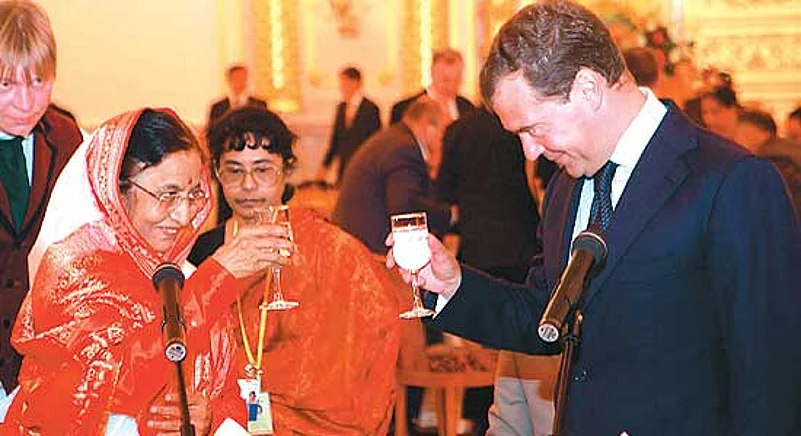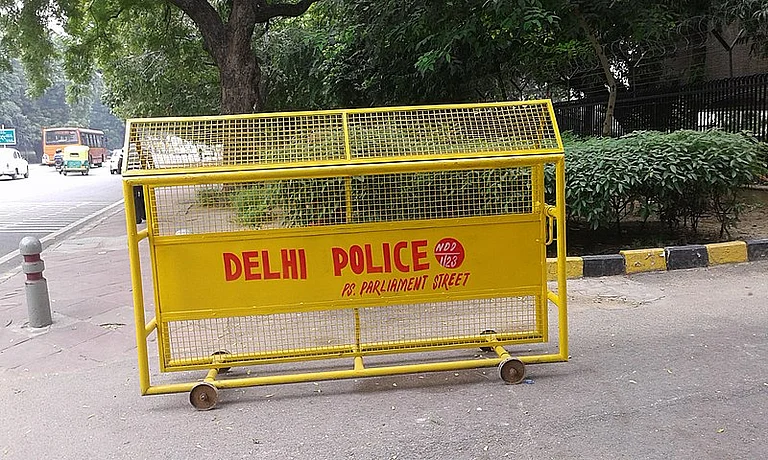September’s the month the mercury begins to dip and Muscovites brace themselves for the harsh winter ahead. This year, though, it seems the summer has delayed its departure for Pratibha Patil, the second Indian president, after A.P.J. Abdul Kalam, to visit Russia. The weather was balmy, and the parks and berms were awash with flowers, bringing colour and exuberance to the gala receptions hosted for her.
But underlying the bonhomie, there were anxieties about the future. The Indians were trying to convince their hosts that, “even as we improve our relations with other countries (read the US), it will not be to the detriment of our tried and trusted friendship”. Indeed, there’s a growing perception in Moscow that its salience in New Delhi’s scheme of foreign relations has diminished, the fizz gradually going out from Indo-Russia relations over the last decade or so. Allaying these apprehensions of Russia was foreign secretary Nirupama Rao, who declared, “We are permanent friends in a changing world.”
.jpg?w=801&auto=format%2Ccompress&fit=max&format=webp&dpr=1.0)
Piped gold: A gas plant on Sakhalin island
Permanent friends perhaps, but Indo-Russian relations have definitely seen better days. Tatiana Shaumin, director of the Centre for India Studies at the Russian Academy of Sciences, says, “Despite our friendship from Soviet times, there’s at present no real dynamism in the relationship. Though some economic and cultural structures which collapsed with the Soviet Union are being rebuilt, and there’s an effort to invigorate the relationship, India and Russia are far from recreating the good old days.”
In the globalised world, that would entail deepening business ties and creating a symbiotic relationship that benefits both India and Russia. Indeed, there’s much catching up to do. For instance, the Indo-Russia trade volume of $7 billion last year lags far behind the figures for business with China ($52 billion) and the US ($43 billion). Conversely, India is also trailing behind countries like China and Japan in tapping Russia’s vast reserves of oil and gas that could secure long-term energy requirements. The challenge facing India is: can it restructure its relations with an old and trusted ally who has been somewhat marginalised in the last decade or so as New Delhi turned its attention westward? As one commentator put it, “The overriding compulsion is to take the Indo-Russian bilateral ties off auto-pilot and steer them towards a newer, more strategic partnership.”
There's no denying that Russia matters to India, possessing as it does 34 per cent of the world’s gas reserves and 13 per cent of its oil reserves. It’s currently the world’s second largest exporter of oil and gas—nearly 90 per cent of it pumped to Europe. In need of adequate energy to fuel its growth, India, through ONGC-Videsh Ltd (OVL), invested $1.5 billion in the Sakhalin-I oil field, off Russia’s east coast, in 2001, and acquired a 20 per cent stake in it. By 2006-end, the first tankers transporting oil from Sakhalin-I began arriving in India.
But the Sakhalin-I oil deal had come cheap to India, struck as it was during the years of economic collapse following the disintegration of the Soviet Union. But today’s Russia is different—it has exploited its gargantuan oil export revenues to bounce back; it no longer favours production-sharing agreements; and it wants to augment its assets and technologies from countries seeking access to its energy resources.
This is precisely why Russia isn’t willing to fulfil India’s hope of doing Sakhalin-III, unless there’s a quid pro quo. When President Vladimir Putin (now prime minister) came to India in January 2007, he expressed Russia’s keenness to participate in India’s downstream energy sector (refining and retail) in exchange for a share in Russia’s upstream (exploration and extraction) assets. “A fierce competition is on to control the growing Indian market and the strongest players involved are the US, China, Japan, the European Union and Russia,” says Shaumin. “While we in Russia have to realise that India has an independent foreign and economic policy and its actions on the world stage are aimed at protecting its economic and security interests, India has to meet us midway.”
Similarly, former Indian diplomat M.K. Bhadrakumar says, “Despite the bedrock of trust which we enjoy with Russia, we need to build content into our relationship. Energy is one area that has not received sufficient focus from our side, despite many opportunities. Given the new energy paradigm in Russia, we need to come up with ingenious methods to cooperate in this sector.”
It seems India has already started to rethink its energy strategy vis-a-vis Russia. It’s learnt that Union petroleum minister Murli Deora, the only cabinet member who accompanied the president to Moscow, offered Russia a stake in Indian Oil Corporation’s proposed $4 billion Paradip oil refinery and a petrochemical project in Orissa. In bagging a slice of Russia’s oil and gas resources, India is facing stiff competition, among others, from China and Japan. As Alexey Miller, who heads the Russian gas major, Gazprom, says, “If we speak of India, we should also speak of China. They are both major players in the energy market and have entered into serious competition for resources.” China’s Sinopec is already working on the Venin block of Sakhalin-III with the Russian firm Rosneft.
Energy apart, Russia, with its MiG-35, too will join the scramble to bag the lucrative $10-billion contract for 126 multi-role combat aircraft India wants to buy. And though Indo-Russia defence cooperation extends beyond the buyer-seller relationship to incorporate joint research and development of military hardware, Moscow is acutely conscious of India’s fascination for American military hardware. Some feel India should award the $10-billion contract to Russia in exchange for its oil assets.
Indeed, Russia won’t play ball with India just because of its rhetoric or just because Russians love Bollywood, which still remains a huge draw. “We may not know the name of your prime minister now like we once knew Nehru and Indira Gandhi, but we do know of Aishwarya Rai and Shahrukh Khan,” says a grey- haired Russian in Moscow’s smart Nouve Arbat street. No doubt, in the coming months, Bollywood will feature prominently in the celebration of the ‘Year of India’ in Russia, which has been designed to showcase India’s economic achievements and trade potential. There will be cultural and literary events too. Just how much India and Russia adapt to the new reality should become evident during the prime minister’s visit in December.

























